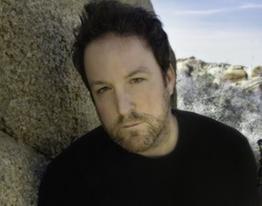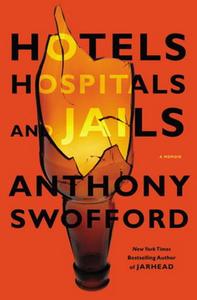 Anthony Swofford's first memoir, Jarhead, was adapted into a 2005 film directed by Sam Mendes. He's also the author of the novel Exit A and his writing has appeared in Harper's, the New York Times Magazine, the Guardian and Slate. Swofford's new memoir, Hotels, Hospitals, and Jails, was published by Twelve on June 5, 2012. He lives in upstate New York with his wife, the writer and photographer Christa Parravani, and their daughter.
Anthony Swofford's first memoir, Jarhead, was adapted into a 2005 film directed by Sam Mendes. He's also the author of the novel Exit A and his writing has appeared in Harper's, the New York Times Magazine, the Guardian and Slate. Swofford's new memoir, Hotels, Hospitals, and Jails, was published by Twelve on June 5, 2012. He lives in upstate New York with his wife, the writer and photographer Christa Parravani, and their daughter.
On your nightstand now:
The Good Father by Mark O'Connell; The Power and the Glory by Graham Greene; Goodnight Moon by Margaret Wise Brown; Young Stalin by Simon Sebag Montefiore; Cathedral by Raymond Carver; Gandhi: A Very Short Introduction by Bhikhu Parekh; Fortunate Son by Lewis B. Puller, Jr.; The Battle for Spain by Antony Beevor.
Favorite book when you were a child:
I Want to Be a Fireman by Carla Greene. I read anything I could get my hands on, including my older sister's books--she had better taste. The fireman book is my only childhood book I still have possession of, and for a reason I can't figure out, it sits next to Escoffier in the dining room cookbook shelves.
Your top five authors:
Joan Didion, Don DeLillo, Julio Cortázar, Tim O'Brien and Joy Williams.
Book you've faked reading:
I faked reading Moby Dick for about 15 years until I read it over three days while sitting from noon to 4 a.m. at my favorite dive bar in Manhattan, Peter McManus at 19th Street and 7th Avenue. Now I fake having read Don Quixote and all of Dostoevsky except Notes from Underground and the first 50 pages of The Gambler.
Book you're an evangelist for:
Hopscotch by Julio Cortázar.
 Book you've bought for the cover:
Book you've bought for the cover:
A Doubleday paperback of Stendhal's The Red and the Black with a cover drawing by Andy Warhol and a paperback of 'Til Death by Ed McBain with a troubled woman in a nightgown on the cover.
Book that changed your life:
Hopscotch by Julio Cortázar. I had heard from teachers and writers that "if it works, it works" when attempting to explain innovation in prose writing. But only after reading Hopscotch did I know what that meant and begin to understand that with prose anything is possible.
Favorite line from a book:
"War is the poetry of men, by which they seek to gain attention and relief throughout their lives" --from Thomas Bernhard in Gathering Evidence. Bernhard was combative and ornery and had witnessed the ravages of war as a young boy in Germany.
I'll include a second if you don't mind: "But this too is true: stories can save us." Tim O'Brien wrote this in The Things They Carried, which I first read as a college student, a few years out from my own war. I didn't believe him at first, and then I started to write, and now I believe him, and we all must.
Book you most want to read again for the first time:
Absalom, Absalom by William Faulkner. Like Hopscotch, Absalom, Absalom taught me the power of finely rendered prose.
Your favorite cookbook:
The River Cottage Meat Book by Hugh Fearnley-Whittingstall. His 24-hour "Donnie Brasco" pork shoulder is transcendental.

